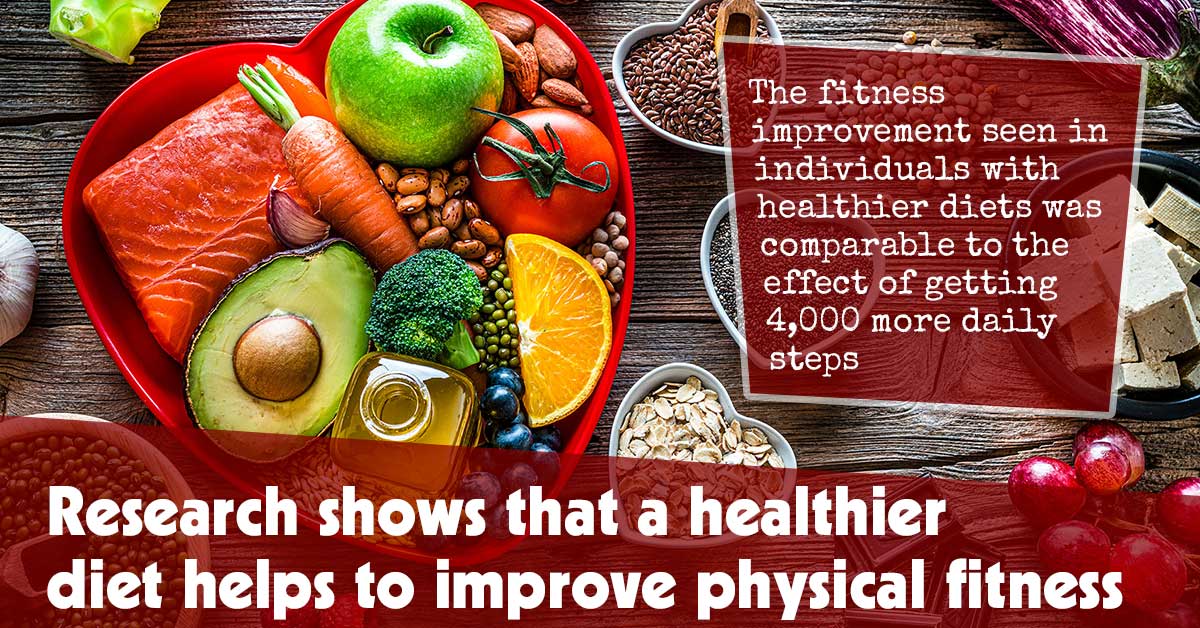According to research, a healthy diet is linked to improved physical fitness. This study presents some of the most robust and thorough data to support the association that healthier diets could result in improved fitness. The fitness improvement seen in individuals with healthier diets was comparable to the effect of getting 4,000 more daily steps.1✅ JOURNAL REFERENCE
DOI: 10.1093/eurjpc/zwad113
Cardiorespiratory fitness reflects the ability of the body to provide and make use of oxygen for exercise, and it incorporates the health of multiple organ systems, which include the muscles, blood vessels, lungs, and heart. It’s one of the most reliable predictors of health and longevity.
Although exercise improves cardiorespiratory fitness, there are also fitness differences in individuals exercising the same amount, which suggests other contributing factors. A nutritious diet is linked to a variety of health benefits, but it has not been clear whether it’s also associated with fitness.
This study looked at whether a healthy diet is linked to physical fitness in 2,380 individuals with an average age of 54 years from the Framingham Heart Study.
For measuring peak VO2, a cardiopulmonary exercise test was performed on a cycle ergometer with maximum effort. This is the gold standard fitness assessment and shows the amount of oxygen made use of during the maximum possible intensity exercise.
The Harvard food frequency questionnaire was also completed to assess consumption of 126 dietary items throughout the last year which ranged from never or less than once a month to 6 or more daily servings.
The information was used for rating the quality of diet making use of the Mediterranean-style Diet Score from 0 to 25 and the Alternative Healthy Consuming Index from 0 to 110, which are both linked to heart health. Higher scores were an indication of a healthier diet that emphasized fruits, vegetables, whole grains, legumes, nuts, fish, and healthy fats and restricting alcohol and red meat.
The connection between diet quality and fitness was assessed after other factors were controlled for that could influence the association, such as sex, age, BMI, total daily energy consumption, cholesterol levels, smoking status, diabetes, blood pressure, and routine physical activity levels.
The average Alternative Healthy Consuming Index and Mediterranean-style Diet scores were 66.7 and 12.4. In comparison to the average score, a 13-point increase on the Alternative Healthy Consuming Index and 4.7 point increase on the Mediterranean-style Diet Score was linked to a 5.2% and 4.5% higher peak VO2.
Healthy dietary patterns were favorably linked to fitness in middle-aged individuals even after habitual activity levels were taken into account. The association was comparable in men and women, and more noticeable in individuals younger than 54 years in comparison to older individuals.
To understand the potential mechanism behind the association between fitness and diet, the researchers carried out more analyses. The association between the quality of diet, fitness, and metabolites was examined. Metabolites are substances that are produced during the digestive process and released into the blood while exercising.
201 metabolites in total were measured in blood samples taken from 1,154 of the individuals. 24 of the metabolites were linked to either favorable or poor diet and fitness, even after the same factors taken into consideration in the prior analyses were adjusted for.
The metabolite data indicate that healthy eating is linked to healthier metabolic health, which may be why it results in improved fitness.
As this was an observational study, it cannot be concluded that eating healthily leads to improved fitness, and the possibility of a reverse association cannot be excluded, i.e. that fit people choose to eat a healthy diet.



